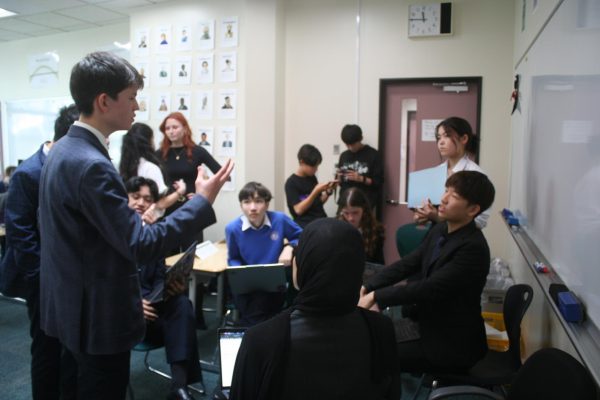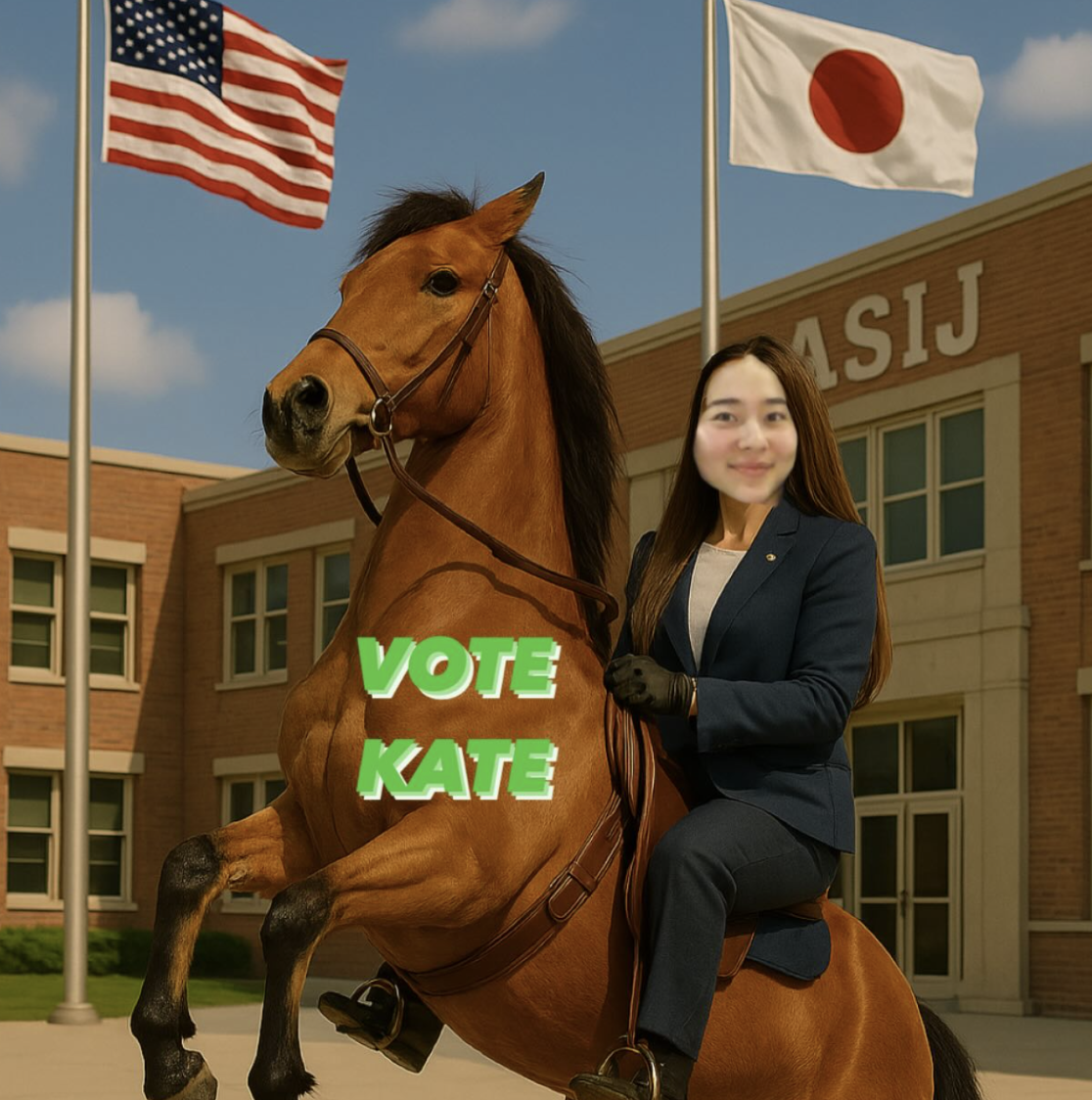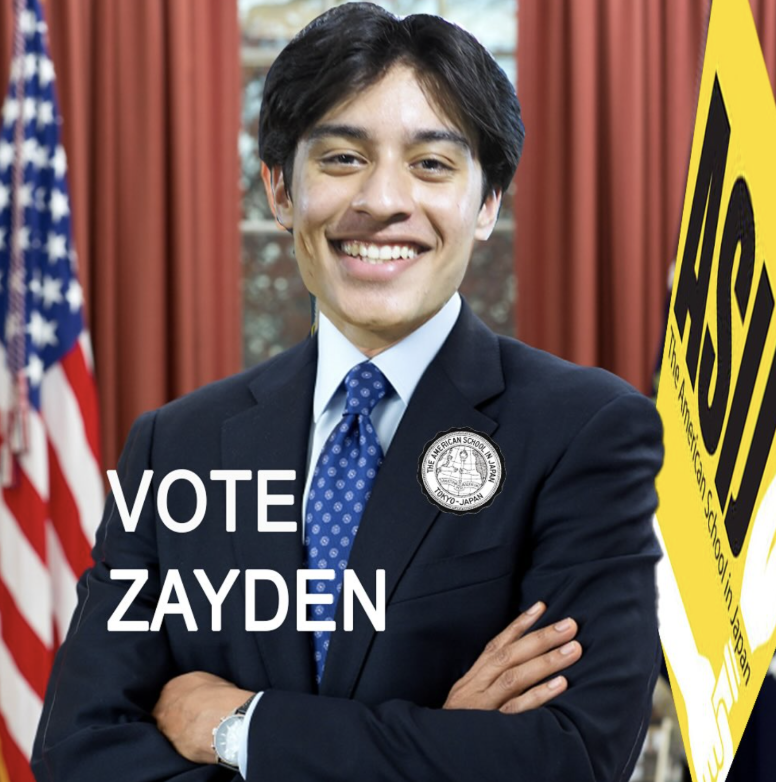Behind the Scenes of the Fall Play with Cooper Johnson
November 3, 2022
It was the first time the HS Fall Play would rehearse the entirety of Shakespeare’s A Midsummer Night’s Dream without stopping. Cooper Johnson, ASIJ senior and Head Stage Manager, checked her rehearsal schedule and took attendance before getting the attention of the room to begin the run-through. “Places for pre-show,” she called.
“Thank you. Places,” the actors replied in unison. As Cooper announced the number of minutes until the show was to begin, actors scurried around the Black Box miming their pre-show routine. A nervous silence settled over the room before Cooper gave the first cue and began rehearsal.
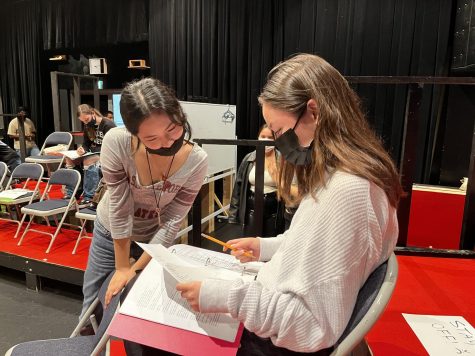
If she were still in middle school, Cooper would have been on the stage herself. She was passionate about acting—and is still a recurring cast member of the HS Musical—but she wanted to try something behind the scenes. In eighth grade, Cooper got a job shadowing the then high school stage manager. “That stage manager was really, really good,” she said, “Everyone respected her and she got to tell everyone what to do. I wanted to do that too.” She secured the role for the Fall Play as a freshman and has been stage managing every year since.
The first run-through of the play wasn’t perfect. Cooper and her assistant stage managers—Anna Armstrong, Marta Kachel, and Ana Reif—kept their eyes on the script and noted when actors deviated. As Head Stage Manager, Cooper’s copy of the script (known as “The Bible” among cast and crew) not only has the lines of dialogue, but also notes on every sound cue, lighting cue, and perhaps most importantly, the blocking—how the actors should enter and exit the stage, and what they should be doing during each scene. She kept track of everything during their performance.
Ultimately, those blocking decisions were made by the director of the play, Damon Shearer, the new Drama and Film teacher at ASIJ. During earlier rehearsals of the play, it was Cooper’s responsibility to write down the blocking Mr. Damon came up with, as he came up with it. “[That is] what’s hard about being a stage manager,” Cooper said, “A lot of the time you have your head down. You’re not even watching the rehearsal because you are just listening to what the director is saying.” Often, scenes go through many iterations and Cooper has to adjust her notes on the fly to keep her script up to date.
Despite the frantic note-taking her job necessitated, Mr. Damon also included Cooper in the creative process. “He does ask the stage managers a lot for their opinion,” Cooper said. If she thought a piece of blocking felt awkward and should be changed, she might chime in. Her sense for directorial soundness is a skill she developed in her four years as a stage manager, and one she says she would need to continue to improve to gain the discerning creative vision of a director.
Indeed, creative vision was required to imagine a whimsical summer night during that first unassisted run-through. Yet the seeds were there: Mr. Damon was impressed with how well the actors had memorized difficult Shakespearean language; the set, although unpainted, had a multi-tiered platform and a walkable arch bridge; and as the actors rehearsed, the costume department sewed cloaks and fitted suits in the background.
Once the run-through had finished, the cast gathered on the stage so that the stage managers could point out any major slip-ups and offer general style suggestions. Cooper reminded them to stay in character even as they walked off stage and out of sight of the audience. Mr. Damon, speaking last, urged his actors to project their voices. Overall, he was optimistic. 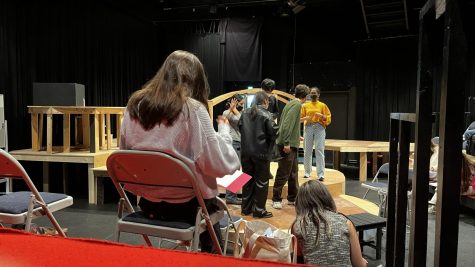
Two weeks later, the show opened its doors. The Black Box had transformed from a slightly messy high school rehearsal room into a dreamy bamboo forest, populated by sharply dressed Athenian nobles, a bumbling acting company, and glittering fairies. For the performances themselves, Cooper had control. Above the Black Box there is a booth from which Cooper called sound and lighting cues and gave directions to her assistants who were backstage. “If anything goes wrong in the show, I’m to blame,” she said, “It always comes back to the head stage manager. It was my responsibility to make sure everything went smoothly.”
For the cast and crew, Cooper’s role in the success of the production was immense. She was part of the process from first audition to final bow, yet she remains largely invisible to the average theatergoer. In some ways, that isn’t such a bad thing, she says. Her hidden presence adds to the audience’s suspension of disbelief, and for that, she will gladly stay out of the spotlight.









